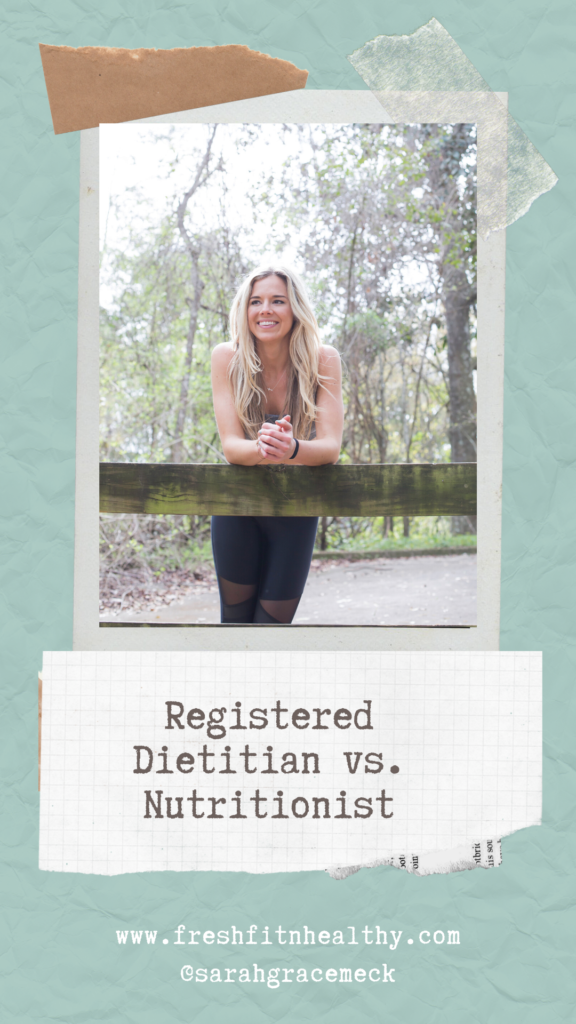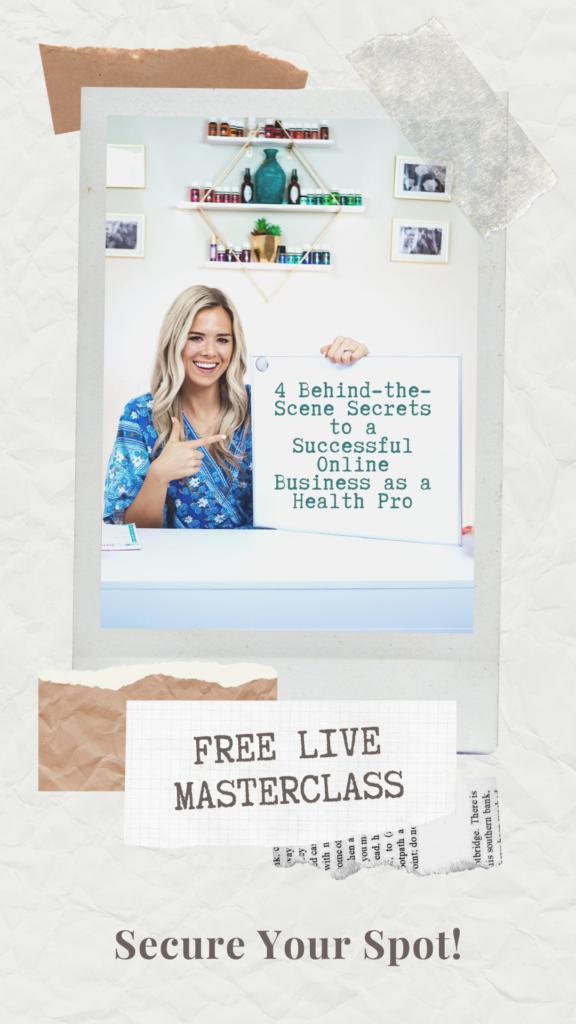Do you know the difference between a Registered Dietitian and a Nutritionist? This week I’m breaking it all down for you and showing you the differences in each title you see.
Listen to the Dietitian vs. Nutritionist episode below instead of reading right here (or listen to it on iTUNES here, or on SPOTIFY right here!:
One thing I’ve been realizing while in conversation with people is: They think nutritionist, health coach, nutrition coach, nutrition expert,.. Are all the same as a registered dietitian (RD). With social media.. there’s been an increase in all these Nutritionists, Health Coaches and more. You can find thousand of people with the term “nutrition expert/coach” in their bios. So is there a difference? How do you know if they have any credentials to back up their so called “expertise” they talk about.
How many times have you read that you need to eat clean, start juicing or only eat foods that have a specific number of ingredients? The advice may be compelling, and even sound science-y, but in the age of Google and information overload, you have to be careful about who you’re turning to for advice.

Registered Dietitian vs. All Other Nutrition Titles
Nutrition isn’t common sense – it’s a specialized science. And a registered dietitian is tightly regulated.. Whereas many of the other nutrition titles you see out there aren’t.
Which is why knowing the difference between a professional and someone who simply knows how to use google/has had their own transformation of some kind… is so important when it comes to living out your best, healthiest life. I mean, that’s why you feel so confused right? All the contradictory information coupled with so many different programs and diets claiming THIS is the way to get results?
So who SHOULD you be listening to or seeking help from? Let’s break down all the “titles” you see out there.
If you take a look on instagram nowadays you’ll see lots of people claiming to be
- Health coach
- Nutritionist
- Nutrition expert
- Nutrition coach
- Wellness coach
- Dietitian
What exactly are these titles and what does to take to become certified?
Nutritionist: (the only other one other than a dietitian that COULD be a reliable source, read below)
- ****DISCLAIMER: There are MANY amazing nutritionists that come from very sound certification programs. However your next door neighbor could all of a sudden love nutrition and also call herself a nutritionist, with no credentials. So simply guard your mind and don’t blindly listen to anyone calling themselves a nutritionist. Look for their background to see if there are qualifications backing up their title.
- “A nutritionist is a person who advises others on matters of food and nutrition and their impacts on health.”
- If you google nutritionist several suspicious sites offer certifications. They’re easy to obtain and don’t add much value.
- Most Nutritionists typically do not have any professional training, and therefore, should not be involved in the diagnosis and treatment of any diseases.
- Certification is optional.
- Anyone can call themselves a nutritionist, which is why it’s hard to tell between the qualified and your best friend who just loves talking about nutrition.
- Even those with a certification can’t provide medical nutritional therapy. That is, to prescribe nutritional changes specifically to treat disease. Meal Planning is prescribing, and therefore not allowed by even the qualified/credentialed nutritionists
Health Coach
- If you google health coach this is the first definition to pop up “ Health coaching is the use of evidence-based skillful conversation, clinical interventions and strategies to actively and safely engage client/patients in health behavior change.” Sounds great right!! BUT…
- Certification is optional!
- Anyone can call themselves a health coach.
Nutrition coach
- “A nutrition coach or health coach may or may not be a state licensed dietitian. A nutrition coach typically provides nutrition guidance but also goes beyond the scope nutrition and uses non-dietary approaches to motivate clients to make positive lifestyle changes”
- Certification is optional.
- Anyone can call themselves a nutrition coach.
Wellness coach:
- “A wellness coach is a professional who helps people assess their current physical and emotional state, and helps them set goals for what they want to achieve in their overall wellness and health by working with them on plans of action to reach these goals.”
- No certification needed.
- Anyone can call themselves a wellness coach.
So i’m guessing you see the pattern too? None of these require any certification. How scary is that! Imagine if it were legal for anyone on the streets to give out medical advice as if they were a doctor. Now as I said, there CAN be sound nutritionists out there. But remember that the title isn’t regulated, so look credentials to back up the title before listening… and simply being a personal trainer doesn’t count as being qualified for giving nutrition advice.
What is a Registered Dietitian?
What makes a dietitian stand out? NBC News calls registered dietitians the “real nutrition pros”… let’s talk about why that is.
Someone can ONLY receive the RD credentials/title after completing these 4 things:
- A minimum of a four year college degree from an accredited university’s program that includes specific course work in human physiology, nutrition science, and other sciences
- 1200 hours supervised hands-on internship
- Passing a comprehensive examination
- Completing ongoing continuing education.
- Bonus: RDs are also held to a professional code of ethics.
It’s important to point out that the term “certified” is loosely used. Dietitians all over the country take one exam held by the Academy of Nutrition and Dietetics, this exam is comparable to the LSAT which is taken by lawyers. Unlike Dietitians, One google search offers Health Coaches and Nutritionists a vast majority of random programs which can certify them. There is no regulation for these certification programs, and some seem very easy to obtain. So even if someone claims to be certified you should still be weary, and look into the program.
What are the limits?
Personal trainers/health coaches/nutritionists CAN talk to clients about what they eat. And they’re allowed to make general suggestions about the kind of food that’s likely to support their clients’ goals. But there are limits to what personal trainers, health coaches, and other non-Registered Dietician (RD) professionals can say about nutrition.
Therefore, if you’re not a registered dietitian or doctor, you CANNOT legally:
- prescribe diets or supplements to treat medical and clinical conditions;
- prescribe diets to treat symptoms of medical and clinical conditions; nor
- diagnose medical conditions.
Example: So if you’re a personal trainer, health coach, or strength coach and a client comes asking what diet to follow to treat their diabetes — that’s outside your scope of practice. It’s MNT and therefore illegal unless you’re a RD.
Another scenario: Let’s say you’re a fitness professional and you have an obese client. You’re not allowed to “prescribe a diet” to “treat” their obesity. That’s MNT and reserved for licensed dietitians or medical professionals.
Another scenario: They CANNOT “recommend fish oil” for “treating arthritic knee pain”. They CAN “share evidence” that “fish oil supports healthy movement”.
In the end, it’s best (unless you’re a RD) to avoid “treating”, “prescribing”, and “diagnosing”. Note: giving someone a meal plan is considered “prescribing”.
See the difference to look for?
If you’re looking for sound nutrition advice, make sure to look past the IG bio lines, and into whether they have any right/expertise to be talking about what they are. Just because something worked for them, doesn’t work for everyone. And that’s why I call myself a nutrition agnostic. As a health professional and registered dietitian, I’m here to help women out as an individual, not give them what worked for my last client. What works for one person may be totally inappropriate, not effective, or even dangerous for another person. That’s why formal training and credentials are so important.
Throughout my years as a practitioner, I’ve seen clients and friends harmed by nutrition advice given by people without adequate training. In most cases, the people who gave the advice truly believed they were helping, and didn’t realize why their advice was poor. Again, it’s just like any other specialty – a person who completed one year of medical school probably knows more than a person with no medical training, but it’s the lack of those extra years and residency that can lead to a wrong diagnosis or treatment.
Bottom line: nutrition isn’t common sense – it’s a specialized science.
Before you put your trust in any health professional’s hands, including a nutrition professional, be sure you feel confident in his or her qualifications.
Head to www.freshfitnhealthy.com to grab the right resources for you, or to apply for my 1-1 coaching program — whether you’re seeking out sound nutrition guidance for your own life to honor your body, or you’re a health professional wanting to gain more insight on how to utilize your expertise online.
Click here to read all about one of my clients life changing experiences with the 1-1 coaching program!
And lastly, if you’re a health professional looking to take your expertise online, click here for a free, live masterclass coming up!
ps: Would you do two quick things for me today? Would you share this episode out so more people can learn there IS a difference, so we can breakthrough all the confusion and food myths together? And lastly, I would absolutely love if you left a good review on the podcast right here!
